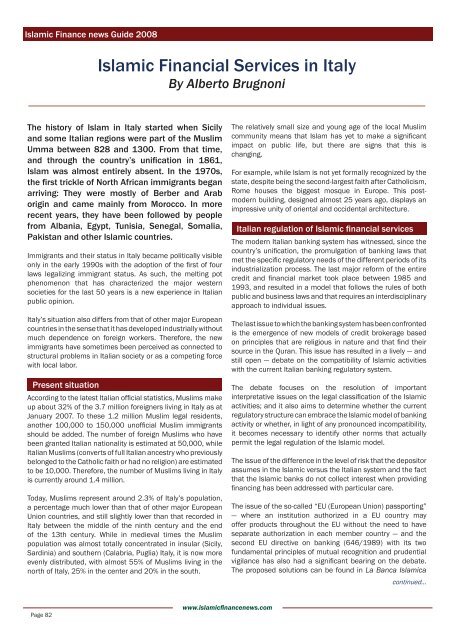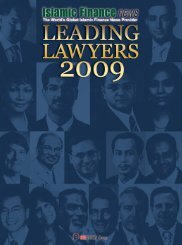Create successful ePaper yourself
Turn your PDF publications into a flip-book with our unique Google optimized e-Paper software.
<strong>Islamic</strong> <strong>Finance</strong> news Guide 2008<br />
Page 82<br />
<strong>Islamic</strong> Financial Services in Italy<br />
By Alberto Brugnoni<br />
The history of Islam in Italy started when Sicily<br />
and some Italian regions were part of the Muslim<br />
Umma between 828 and 1300. From that time,<br />
and through the country’s unifi cation in 1861,<br />
Islam was almost entirely absent. In the 1970s,<br />
the fi rst trickle of North African immigrants began<br />
arriving: They were mostly of Berber and Arab<br />
origin and came mainly from Morocco. In more<br />
recent years, they have been followed by people<br />
from Albania, Egypt, Tunisia, Senegal, Somalia,<br />
Pakistan and other <strong>Islamic</strong> countries.<br />
Immigrants and their status in Italy became politically visible<br />
only in the early 1990s with the adoption of the fi rst of four<br />
laws legalizing immigrant status. As such, the melting pot<br />
phenomenon that has characterized the major western<br />
societies for the last 50 years is a new experience in Italian<br />
public opinion.<br />
Italy’s situation also differs from that of other major European<br />
countries in the sense that it has developed industrially without<br />
much dependence on foreign workers. Therefore, the new<br />
immigrants have sometimes been perceived as connected to<br />
structural problems in Italian society or as a competing force<br />
with local labor.<br />
Present situation<br />
According to the latest Italian offi cial statistics, Muslims make<br />
up about 32% of the 3.7 million foreigners living in Italy as at<br />
January 2007. To these 1.2 million Muslim legal residents,<br />
another 100,000 to 150,000 unoffi cial Muslim immigrants<br />
should be added. The number of foreign Muslims who have<br />
been granted Italian nationality is estimated at 50,000, while<br />
Italian Muslims (converts of full Italian ancestry who previously<br />
belonged to the Catholic faith or had no religion) are estimated<br />
to be 10,000. Therefore, the number of Muslims living in Italy<br />
is currently around 1.4 million.<br />
Today, Muslims represent around 2.3% of Italy’s population,<br />
a percentage much lower than that of other major European<br />
Union countries, and still slightly lower than that recorded in<br />
Italy between the middle of the ninth century and the end<br />
of the 13th century. While in medieval times the Muslim<br />
population was almost totally concentrated in insular (Sicily,<br />
Sardinia) and southern (Calabria, Puglia) Italy, it is now more<br />
evenly distributed, with almost 55% of Muslims living in the<br />
north of Italy, 25% in the center and 20% in the south.<br />
www.islamicfi nancenews.com<br />
The relatively small size and young age of the local Muslim<br />
community means that Islam has yet to make a signifi cant<br />
impact on public life, but there are signs that this is<br />
changing.<br />
For example, while Islam is not yet formally recognized by the<br />
state, despite being the second-largest faith after Catholicism,<br />
Rome houses the biggest mosque in Europe. This postmodern<br />
building, designed almost 25 years ago, displays an<br />
impressive unity of oriental and occidental architecture.<br />
Italian regulation of <strong>Islamic</strong> fi nancial services<br />
The modern Italian banking system has witnessed, since the<br />
country’s unifi cation, the promulgation of banking laws that<br />
met the specifi c regulatory needs of the different periods of its<br />
industrialization process. The last major reform of the entire<br />
credit and fi nancial market took place between 1985 and<br />
1993, and resulted in a model that follows the rules of both<br />
public and business laws and that requires an interdisciplinary<br />
approach to individual issues.<br />
The last issue to which the banking system has been confronted<br />
is the emergence of new models of credit brokerage based<br />
on principles that are religious in nature and that fi nd their<br />
source in the Quran. This issue has resulted in a lively — and<br />
still open — debate on the compatibility of <strong>Islamic</strong> activities<br />
with the current Italian banking regulatory system.<br />
The debate focuses on the resolution of important<br />
interpretative issues on the legal classifi cation of the <strong>Islamic</strong><br />
activities; and it also aims to determine whether the current<br />
regulatory structure can embrace the <strong>Islamic</strong> model of banking<br />
activity or whether, in light of any pronounced incompatibility,<br />
it becomes necessary to identify other norms that actually<br />
permit the legal regulation of the <strong>Islamic</strong> model.<br />
The issue of the difference in the level of risk that the depositor<br />
assumes in the <strong>Islamic</strong> versus the Italian system and the fact<br />
that the <strong>Islamic</strong> banks do not collect interest when providing<br />
fi nancing has been addressed with particular care.<br />
The issue of the so-called “EU (European Union) passporting”<br />
— where an institution authorized in a EU country may<br />
offer products throughout the EU without the need to have<br />
separate authorization in each member country — and the<br />
second EU directive on banking (646/1989) with its two<br />
fundamental principles of mutual recognition and prudential<br />
vigilance has also had a signifi cant bearing on the debate.<br />
The proposed solutions can be found in La Banca <strong>Islamic</strong>a<br />
<strong>continued</strong>...

















